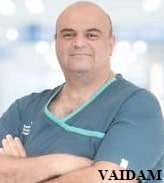The cost of Gastric Bypass includes:
Preoperative diagnostic tests cost (complete blood count (CBC), urinalysis, chemistry panel, chest X-ray, ECG, and gallbladder ultrasound)
Surgery cost
Types of surgeries [Roux-en-Y (roo-en-wy) gastric bypass, Sleeve gastrectomy, Biliopancreatic diversion with duodenal switch]
Post-Operative cost (depends on the number of follow-up sessions)
Medicine cost
Patient's hospital stay
Note: Post Surgery patients will have to follow a proper diet plan by a nutritionist for the next 12 months.
The overall cost of the procedure also varies based on the patient's condition and preferences. Some of these factors are:
Type of hospital and room opted (General, Twin sharing, or single room)
The severity of the disease
Post-surgical complication, if it happens (such as Hemorrhage, Infection, Blood clots)
Cost of Blood products (if required)
Age of the patient
An extended stay at the Hospital
Cost of Accommodation during follow-ups, in case the patient is not a local resident
Tests such as a complete blood count (CBC), urinalysis, chemistry panel, chest X-ray, ECG, and gallbladder ultrasound are done before gastric bypass surgery. These test costs are covered in the package.
When the patient is taking treatment in the hospital, all the pharmacy and medicine costs are included in the package. If they consume medicines outside the hospital, it is usually not covered in the package.
Most gastric bypass surgery is laparoscopic, which takes a shorter recovery time, and you can stay in the hospital for 2 days. However, after open gastric bypass surgery, you need to stay in the hospital for up to 4 days. You should go for the first follow-up visit 2-3 weeks after the surgery, and the second visit is 4-5 weeks after the surgery. Attending 4-6 follow-up meetings during your first post-operative year is vital.
Popular Cities in United Arab Emirates for Gastric Bypass Treatment are:
Listing popular specialists:

Consultant, 28 years of experience

<p>Bariatric and Metabolic Surgery, Laparoscopic Colorectal and Hepato Biliary Surgery, Laparoscopic Upper GI Surgery including Antireflux Surgery, Laparoscopic Oncosurgery, Endocrine and Breast Surgery, Laser Surgery for Varicose Veins, Piles, Fissures and Fistulas</p>

Senior Consultant, 20 years of experience

Laparoscopic bariatric surgery, Metabolic syndrome, Diabetes and Hypertension.

Consultant, 15 years of experience

Thyroid Surgeries, Breast Surgeries and Microdochectomy, Anal surgeries
Our Services for Gastric Bypass Treatment in United Arab Emirates
Transparent - Professional - Without Hassles
One should work alongside the doctor to choose the best weight loss procedure for you. Gastric bypass patients lose between 50 to 80 percent of excess bodyweight within 12 to 18 months, on average. Gastric sleeve patients lose between 60 and 70 percent of their excess body weight within 12 to 18 months, on average.
For all bariatric procedures, pure reversal without conversion to another bariatric procedure is almost certainly followed by a return to morbid obesity. Gastric bypass can be reversed, though this is rarely required.
Thats right.. Bariatric surgery helps patients get rid of a lot of medical problems such as Asthma, DIabetes, Hypertension, Obstructive Sleep Apnea etc.
Most women can get pregnant after a gastric sleeve surgery, the procedure itself can help in case infertility was related to obesity However, it is advised to postpone a pregnancy for 18 months after the surgery and to allow the body to stabilize weight for healthy pregnancy.
Usually three days.
Medical complications that can arise are bleeding, leakage, DVT, hernia, obstruction. Thankfully, they are all treatable conditions and the incidence rate for these complications are between 2% - 5%.
It is about 0.3%
Gastric bypass surgery is a type of weight loss surgery in which a small pouch is being created in stomach which connects the newly created pouch directly to the small intestine. After gastric bypass surgery food is being swallowed to small pouch of stomach and then directly to small intestine which passes most part of your stomach and first section of your small intestine.
Gastric bypass is done to help you lose excess weight and reduce your risk of potentially life-threatening weight-related health problems, including Gastroesophageal reflux disease, Heart disease, High blood pressure, High cholesterol, Obstructive sleep apnea and many others.
You can qualify for gastric bypass surgery if you have a BMI of 35-39 or even more than it can also go for gastric bypass surgery.
Gastric bypass is a serious surgery it also carries some risks along with it. Some of the risks of the procedure includes infection, blood clots and internal bleeding. A new connection is created in your intestine and stomach which will fully heal within a weak.
Usually lasts for 1-2 hours.
Right before the procedure you have to restrict your eating and drinking and avoid smoking and drinking as prescribed by the doctor.
This surgery takes only few hours to be done under general anaesthesia.
This surgery is being done under general anaesthesia. In some surgery traditional large incisions are being made in your abdomen. After making the incisions with the open or laparoscopic technique, the surgeon cuts across the top of your stomach, sealing it off from the rest of your stomach. The resulting pouch is about the size of a walnut and can hold only about an ounce of food. Then, the surgeon cuts the small intestine and sews part of it directly onto the pouch. Food then goes into this small pouch of stomach and then directly into the small intestine sewn to it. Food bypasses most of your stomach and the first section of your small intestine, and instead enters directly into the middle part of your small intestine.
Hospital stay is generally for one to two days but in some cases it can be even more than it.
Those who undergo weight loss surgery may be asked to take a complete multivitamin, calcium with Vitamin D, iron and Vitamin C, Vitamin D, and Vitamin B12
Yes moderate exercising and diet modifications would be required.
Patients with a desk or sedentary job will be able to return to work 7-10 days after the operation. Those who have strenuous occupations will have activity and lifting limitations until 3 weeks after surgery.
Person can begin walking within 6 hours, follow up on 7th day and go back to normal life after 7 days.
It is found that patient loss between 75% to 80% of the excess weight. General rule of thumb for ideal weight is height (in cm) minus 100. So if you are 180 cm, your ideal weight should be 80 KG. If you are 120 KG then you have about 40 KG of extra weight. You should expect to lose about 30 –32 KG of weight loss post this procedure
You will be given a proper plan by a nutritionist for the next 12 months. You will be on liquid diet for first 2 weeks post surgery, on semi solid diet for next 2 weeks and then you resume to normal solid diet.
Doctor advices patients to maintain a healthy and active lifestyle to avoid regain. The surgery is a great tool to bring patient back to normal one time but there after individual also has to help and maintain that new normal.
Patient is advised for certain vitamins to taken externally for initial few years and then it can be tapered off.
It will take around three to five weeks to recover from gastric bypass surgery. You can go out to do your normal workout in two to three days.
Some of the foods you should avoid after surgery are red meats, greasy, high fat foods, heavy seasoned or spicy food, sugary foods, alcohol, microwave heated foods.
Some of the risks associated with gastric bypass surgery includes excessive bleeding, infection, adverse reaction to anesthesia, blood clots, breathing problems, leaks in gastrointestinal system. Some of the longer risks and complications of the surgery are bowel obstruction, dumping syndrome, gallstones, hernias, ulcers and vomiting.
Immediately after the surgery you have to be on liquid food and you are not allowed to eat any solid food because your stomach and intestine begins to heal. After that you have to follow a special diet plan of eating semi solid and soft food and then you can eat firm foods.
Gastric bypass can provide long-term weight loss. The amount of weight you lose depends on your type of surgery and your change in lifestyle habits.






NABH Certified Healthcare Discovery Platform
Vaidam is NABH certified healthcare discovery platform that will connect you to top-notch medical experts, hospitals, wellness options, and trusted travel partners to help identify and make the right healthcare choices.

Researched & Personalized Treatment Plan - Under One Roof
You can search for the best hospitals, read about them, view photographs of the facilities at the hospitals and the places at which the hospitals are located, and check the cost of treatment.

Quality Treatment Within Your Budget
As soon as you post an enquiry, the patient relation team will collect details from you, share them with the doctors and hospitals on Vaidam's panel, and get a personalized treatment plan. We research to get quality treatment within your budget.

Treatment to Travel
Vaidam concierge assists patients, to get medical Visa, the best airline fares and arrangements for your stay. Our concierge also helps you with daily travel, language, and food concerns. Vaidam does everything to be your perfect host. All of Vaidam’s services are free of cost to patients.

International Reach
Vaidam Health has network in 15+ countries, which includes India, Turkey, UAE, Germany, South Korea, Thailand, Malaysia, Spain.
Note: Vaidam Health does not provide medical advice, diagnosis or treatment. The services and information offered on www.vaidam.com are intended solely for informational purposes and cannot replace the professional consultation or treatment by a physician. Vaidam Health discourages copying, cloning of its webpages and its content and it will follow the legal procedures to protect its intellectual property